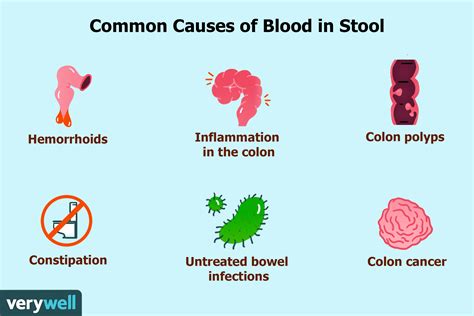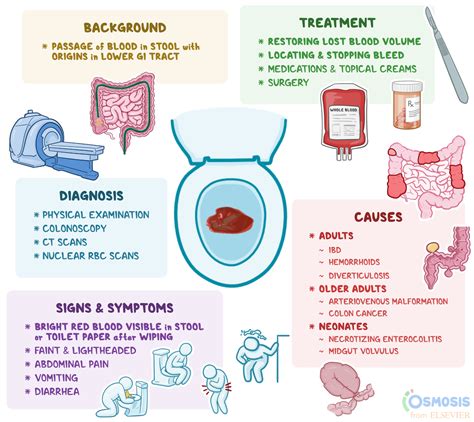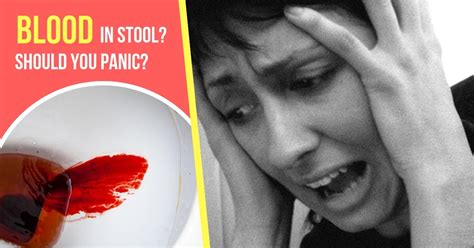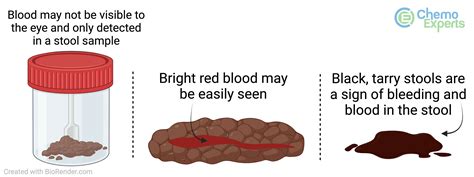Intro
Discover the 5 causes of blood in feces, including digestive issues, infections, and diseases, and learn about symptoms, diagnosis, and treatment options for rectal bleeding and bloody stools.
The presence of blood in feces, also known as rectal bleeding, can be a alarming and unsettling experience for anyone. It is essential to understand the possible causes of this condition to seek appropriate medical attention. Rectal bleeding can range from a small amount of blood on the toilet paper to a significant amount of blood in the stool. In this article, we will explore the 5 causes of blood in feces and provide valuable insights into the symptoms, diagnosis, and treatment options.
The importance of addressing rectal bleeding cannot be overstated. It can be a symptom of an underlying medical condition that requires prompt attention. In some cases, rectal bleeding can be a sign of a life-threatening condition, such as colon cancer or rectal cancer. Therefore, it is crucial to consult a healthcare professional if you experience rectal bleeding. They will help determine the cause and develop an effective treatment plan.
Rectal bleeding can be caused by a variety of factors, including dietary habits, lifestyle choices, and underlying medical conditions. In some cases, rectal bleeding can be a symptom of a minor condition, such as hemorrhoids or anal fissures. However, in other cases, it can be a sign of a more serious condition, such as inflammatory bowel disease or colon cancer. Understanding the possible causes of rectal bleeding is essential to seeking the right medical attention and preventing complications.
Causes of Blood in Feces

There are several possible causes of blood in feces, including:
- Hemorrhoids: Hemorrhoids are swollen veins in the rectum or anus that can cause bleeding, itching, and discomfort.
- Anal fissures: An anal fissure is a small tear in the lining of the anus that can cause bleeding and pain during bowel movements.
- Inflammatory bowel disease: Inflammatory bowel disease, including conditions such as Crohn's disease and ulcerative colitis, can cause rectal bleeding, diarrhea, and abdominal pain.
- Colon cancer: Colon cancer can cause rectal bleeding, changes in bowel habits, and abdominal pain.
- Rectal ulcers: Rectal ulcers are open sores in the rectum that can cause bleeding, pain, and discomfort.
Symptoms of Blood in Feces
The symptoms of blood in feces can vary depending on the underlying cause. Common symptoms include: * Blood on the toilet paper or in the toilet bowl * Red or black stools * Abdominal pain or cramping * Diarrhea or constipation * Itching or discomfort in the anusDiagnosis of Blood in Feces

Diagnosing the cause of blood in feces typically involves a combination of physical examination, medical history, and diagnostic tests. The healthcare provider may perform a:
- Digital rectal examination to check for hemorrhoids, anal fissures, or other abnormalities
- Stool test to check for blood, infection, or inflammation
- Endoscopy or colonoscopy to visualize the inside of the colon and rectum
- Imaging tests, such as a CT scan or MRI, to rule out other conditions
Treatment Options for Blood in Feces
The treatment for blood in feces depends on the underlying cause. Common treatment options include: * Medications to reduce inflammation, bleeding, or pain * Surgery to remove hemorrhoids, anal fissures, or other abnormalities * Lifestyle changes, such as increasing fiber intake, staying hydrated, and exercising regularly * Cancer treatment, such as chemotherapy, radiation therapy, or surgery, if the cause is colon or rectal cancerPrevention of Blood in Feces

Preventing blood in feces involves maintaining a healthy lifestyle and addressing underlying medical conditions. Tips for prevention include:
- Eating a high-fiber diet to prevent constipation and hemorrhoids
- Staying hydrated to prevent constipation and anal fissures
- Exercising regularly to improve bowel function and overall health
- Managing stress and anxiety to reduce the risk of inflammatory bowel disease
- Getting regular check-ups and screenings to detect colon or rectal cancer early
Risk Factors for Blood in Feces
Certain risk factors can increase the likelihood of experiencing blood in feces. These include: * Age: The risk of colon or rectal cancer increases with age * Family history: A family history of colon or rectal cancer, inflammatory bowel disease, or other conditions can increase the risk * Diet: A low-fiber diet or a diet high in processed meats can increase the risk of colon or rectal cancer * Lifestyle: A sedentary lifestyle, smoking, or excessive alcohol consumption can increase the risk of colon or rectal cancerComplications of Blood in Feces

If left untreated, blood in feces can lead to complications, such as:
- Anemia: Chronic blood loss can lead to anemia, a condition characterized by low red blood cell count
- Infection: Bacteria can enter the bloodstream through the rectum, leading to infection and sepsis
- Cancer: Colon or rectal cancer can spread to other parts of the body if left untreated
- Bowel obstruction: A bowel obstruction can occur if the rectum or colon becomes blocked, leading to severe abdominal pain, vomiting, and constipation
Seeking Medical Attention
If you experience blood in feces, it is essential to seek medical attention promptly. The healthcare provider will help determine the cause and develop an effective treatment plan. In the meantime, there are steps you can take to manage the symptoms, such as: * Applying a cold compress to the anus to reduce pain and swelling * Taking over-the-counter pain medications to manage pain and discomfort * Increasing fiber intake to prevent constipation and hemorrhoids * Staying hydrated to prevent constipation and anal fissuresConclusion and Next Steps

In conclusion, blood in feces can be a symptom of an underlying medical condition that requires prompt attention. Understanding the possible causes, symptoms, diagnosis, and treatment options is essential to seeking the right medical attention and preventing complications. If you experience blood in feces, do not hesitate to seek medical attention. The healthcare provider will help determine the cause and develop an effective treatment plan.
We encourage you to share your thoughts and experiences with blood in feces in the comments section below. If you have any questions or concerns, please do not hesitate to ask. You can also share this article with friends and family to raise awareness about the importance of addressing rectal bleeding.
What are the common causes of blood in feces?
+The common causes of blood in feces include hemorrhoids, anal fissures, inflammatory bowel disease, colon cancer, and rectal ulcers.
How is blood in feces diagnosed?
+Blood in feces is diagnosed through a combination of physical examination, medical history, and diagnostic tests, such as stool tests, endoscopy, and imaging tests.
What are the treatment options for blood in feces?
+The treatment options for blood in feces depend on the underlying cause and may include medications, surgery, lifestyle changes, and cancer treatment.
Can blood in feces be prevented?
+Yes, blood in feces can be prevented by maintaining a healthy lifestyle, including eating a high-fiber diet, staying hydrated, exercising regularly, and managing stress and anxiety.
What are the complications of blood in feces if left untreated?
+If left untreated, blood in feces can lead to complications, such as anemia, infection, cancer, and bowel obstruction.
